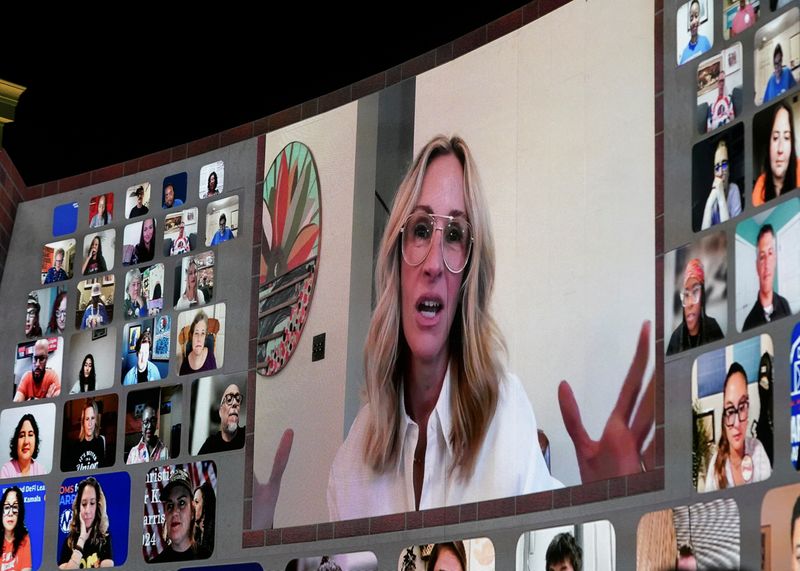By Lisa Richwine
LOS ANGELES (Reuters) - Actor Jennifer Garner had a warning for a crowd of "Moms for Harris" gathered at a tearoom in Tucson, Arizona: Be prepared to see more Hollywood stars visiting your state to talk about the Nov. 5 election.
"Jessica Alba, Kerry Washington - my colleagues and friends - will be here tomorrow. We're all just going to barnstorm you and drive you nuts," Garner said with a smile.
"I'm sure everything is a nightmare. You don't even want to turn on the TV," Garner said to laughter. "That being said, it really is that important."
The "Alias" star was acknowledging the text messages, TV ads, canvassing and other efforts in one of the seven battleground states that will decide whether Democrat Kamala Harris or Republican Donald Trump becomes the next U.S. president.
Celebrity endorsers such as Garner are part of the down-to-the-wire blitz to mobilize voters ahead of Election Day on Nov. 5. A week after her Arizona stop, Garner stumped for Vice President Harris in Pennsylvania and had plans to visit Nevada.
When stars want to campaign, political strategists urge them to visit places where they have a personal connection and to talk about issues they have worked on. They also are pairing them with political heavyweights.
In Garner's case, she joined former policy adviser and Ambassador Susan Rice, and the actor talked about how her parents met in Arizona. A board member for Save the Children, Garner touted Harris' support for child tax credits and higher pay for child-care workers.
Julia Roberts, meanwhile, visited her home state of Georgia and was introduced by former state Representative Stacey Abrams.
Actor Jane Fonda, an advocate for action on climate change, knocked on doors in Michigan to tout Harris and other "climate champions." The Oscar winner and longtime political activist said she had never campaigned door-to-door for a president before.
"I'm doing everything I can," Fonda told one potential voter. "We have to get them elected."
While Hollywood has a reputation for being liberal, some stars are working to turn out the vote for former President Trump. Dennis Quaid, who starred in a recent movie as Republican icon Ronald Reagan, spoke at a Trump rally in California.
"I'm here to tell you that it's time to pick a side," Quaid said to applause.
Other Trump supporters from the entertainment world include musicians Ted Nugent and Kid Rock, and wrestler Hulk Hogan, who spoke at this summer's Republican National Convention.
HELPING OR HURTING?
Will Garner, Quaid or any other movie star make a difference?
Celebrity appearances do amplify messages about voting, said Christian Grose, a political science professor and academic director at the University of Southern California's Schwarzenegger Institute.
If a non-famous person knocks on a door, it affects only that voter. When a celebrity does, it generates media coverage and social media posts that reach beyond that home, Grose said.
Whether that translates into higher turnout depends on the celebrity and the circumstances.
Megastars such as Oprah Winfrey can make a meaningful impact. Winfrey's 2007 endorsement of Barack Obama was credited with driving 1 million votes during the Democratic primary.
And pop megastar Taylor Swift stimulated thousands of new voter registrations with a nonpartisan call for people to register in 2023, according to the nonprofit group Vote.org.
This September, Swift went a step further and endorsed Harris via an Instagram post, which has now received more than 11 million likes.
While the Harris campaign welcomed Swift's support, it may not turn out to be a blessing, according to Mark Harvey, author of "Celebrity Influence: Politics, Persuasion, and Issue-Based Advocacy," published in 2018.
Harvey and other researchers surveyed 1,000 people in August, before Swift's endorsement. Half were shown a photo of Swift with a generic message urging people to vote and half were shown the same image urging votes for Democrats.
In the study, the singer was most influential with undecided voters who were Swift fans. Swifties who saw the general message reported a high likelihood of heading to the polls. The intent to vote declined, however, among the Swift fans who saw the singer calling for ballots for Democrats.
"I think there are a lot people who don't want to mix their entertainment with their politics," said Harvey, an associate professor at the University of Saint Mary in Kansas.
And outside of the elite sphere of the biggest celebrities, studies suggest celebrity endorsements have "no effect to marginal effect" on turnout, Grose said.

Still, it is possible that the presidential race, and some races for the U.S. Congress could be decided by hundreds or thousands of votes.
"I wouldn't put it up there as the most critical part of the campaign," Grose said, "but you certainly can mobilize people with enthusiasm and excitement and a little bit of Hollywood pizzazz showing up in places you wouldn't expect."